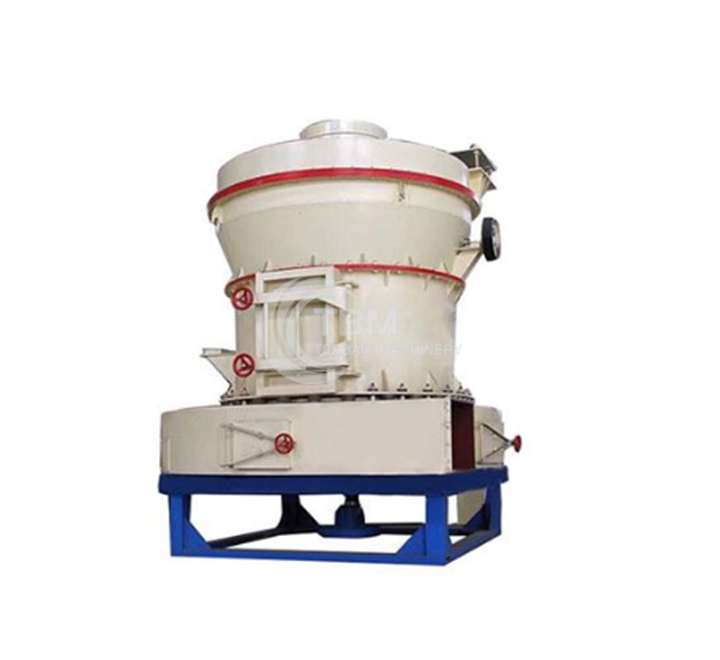
Terbaikmachinery offers Raymond Mills for reliable grinding solutions in various industries. Our Raymond grinding equipment ensures precise material pulverization, enhancing productivity and product quality. Trust Terbaikmachinery for expertly crafted grinding solutions that deliver superior results and optimize your material processing operations.
The Ultrafine Grinding Mill, a refined evolution of the Raymond Mill, is designed to enhance grinding efficiency and precision. Ideal for producing micro and fine powders, this advanced mill features a high-pressure spring mechanism and an adjustable air separator, making it suitable for various applications, including the processing of minerals, ores, and other materials.
The Ultrafine Grinding Mill is composed of several key components:
Mainframe: Includes the frame, air inlet volute, scraper, grinding rollers (3-5), grinding rings, and cover.
Air Blower: Facilitates airflow through the milling system.
Air Separator: Adjusts for precise powder fineness.
Finished Powder Cyclone Collector: Collects the fine powder produced.
Dust Collector: Manages dust emissions for a cleaner operation.
Connecting Pipes and Motor: Integral for operation and connectivity between components.
Applicable Materials
The ultrafine grinding mill can process a wide range of materials, including:
Minerals: Diatomite, phosphate rock, limestone, dolomite, talc, gypsum, graphite, mica, calcite, barite, marble, fluorite, feldspar, quartz, bentonite, bauxite, iron ore.
Other Materials: Coal, ceramics, glass, cement clinker, and more.
The materials processed should have a Mohs hardness of 9 or below and a humidity of no more than 8%.
Application Areas
The ultrafine grinding mill is versatile and widely used across various industries, including:
Mining: For processing ore and mineral materials.
Ceramics: In the production of ceramic materials.
Steel and Iron: For grinding raw materials and improving processing.
Coal: In coal processing and preparation.
Fertilizer: For the production of different fertilizers.
Metallurgy: In metal processing and refining.
Building Materials: For making construction materials.
Power Plant Desulfurization: In reducing sulfur emissions from power plants.
Chemical Industry: For fine chemical processing and production.
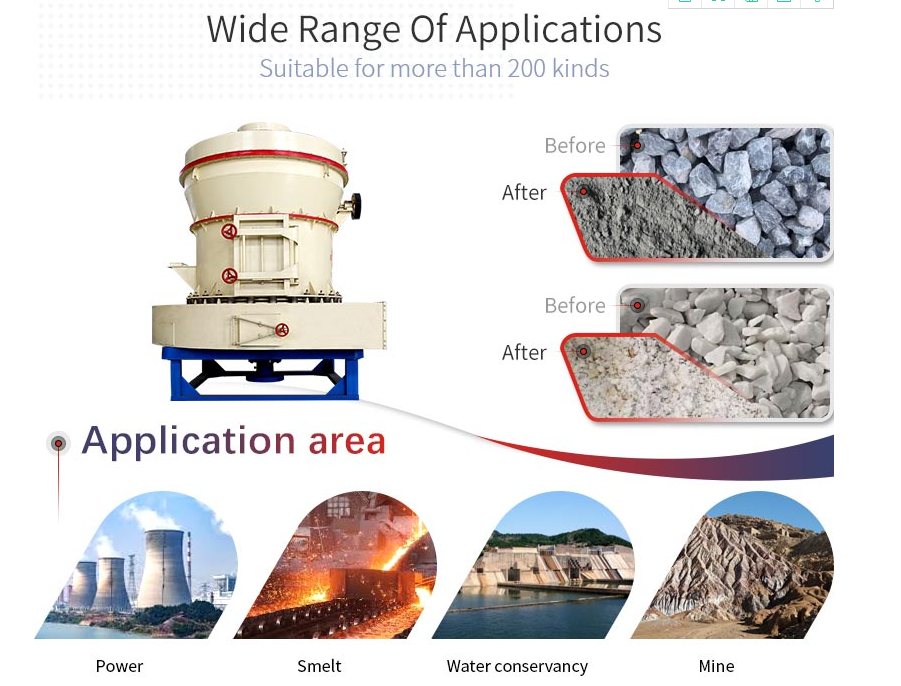
The ultrafine grinding mill, with its advanced design and high-efficiency features, is a valuable tool for producing high-quality fine powders across various applications. It offers enhanced grinding performance, precise powder control, and efficient operation, making it an ideal choice for industries requiring fine and ultra-fine powder production.
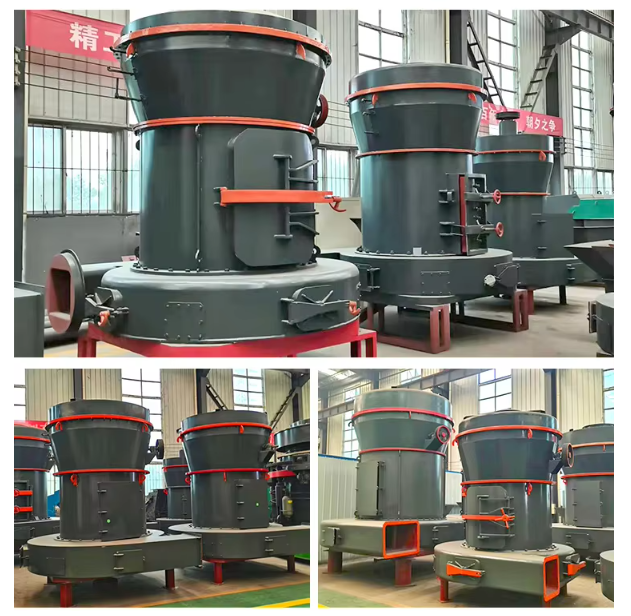
1. Higher Efficiency and Lower Power Consumption: Compared to ball mills, Raymond mills are more efficient and consume less power.
2. Compact Vertical Structure: The mill has a vertical design, requiring a smaller footprint and lower initial investment.
3. Durable and Reliable Operation: Constructed with high manganese steel, the wearing parts are exceptionally durable, ensuring a long service life.
4. Environmentally Friendly: Designed for green milling production, the mill produces minimal dust, contributing to a cleaner workshop environment.
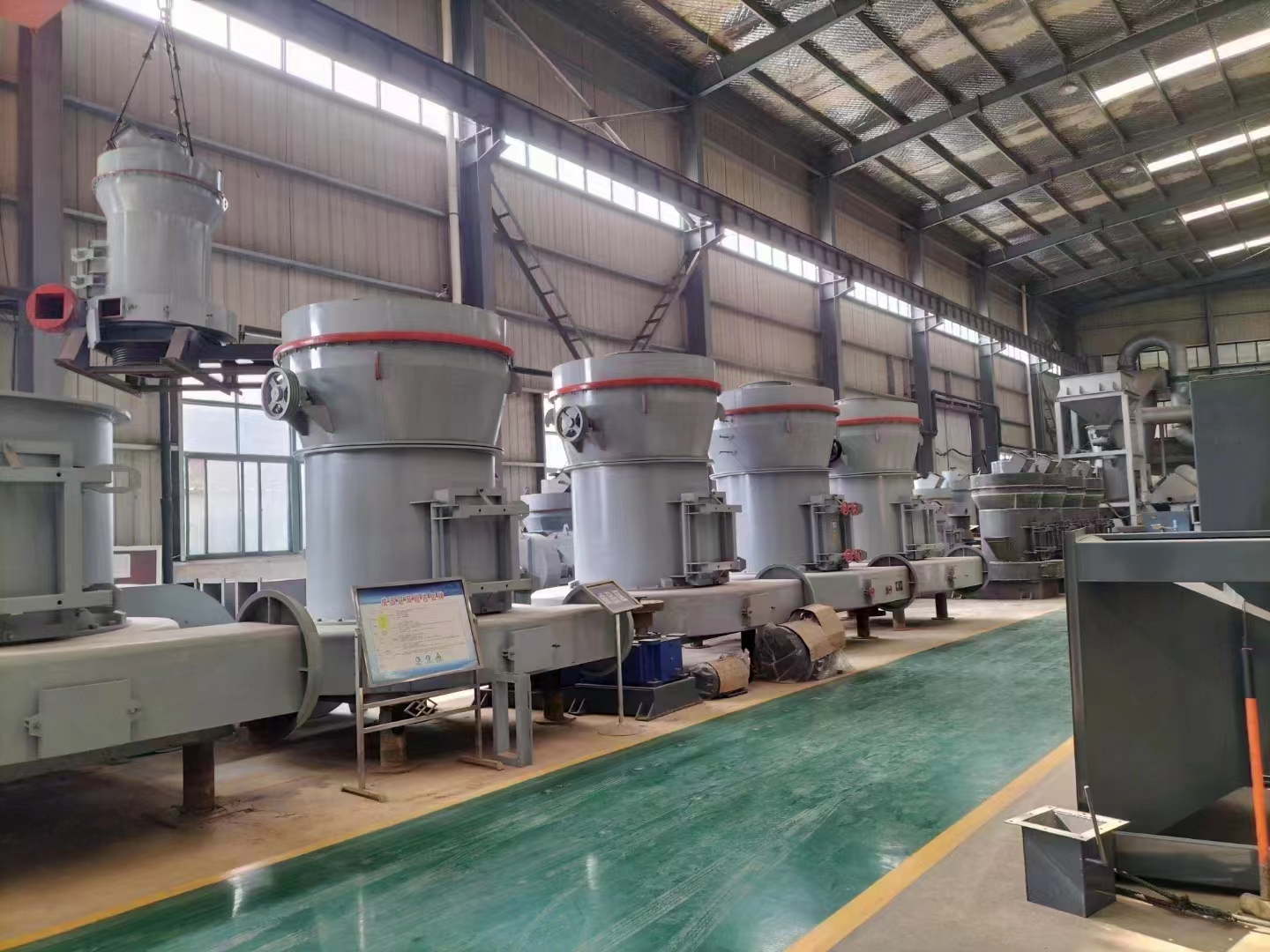
1. Compact Design and Continuous Operation: The ultrafine grinding mills are designed for 24/7 operation with low energy consumption.
2. Enhanced Grinding Efficienc: Equipped with a high-pressure spring, the mills improve output through enhanced grinding.
3. Advanced Fine Powder Classification: Features a turbo-type air separator and a variable frequency motor for superior fine powder classification.
4. High-Quality Finished Product: Produces a fine, uniform product free of impurities.
5. Smooth Operation and Accurate Analysis: Utilizes soft connections, rubber pads, and unique steel frames for smooth operation and precise analysis.
6. Wear-Resistant and Easy Maintenance: Grinding components are made from a wear-resistant alloy, making maintenance straightforward.
7. Advanced Sealing Technology: Incorporates a mechanical air-blocking seal and overlapping multi-stage seal, extending the lubrication cycle, reducing noise, and eliminating over 99% of dust.
These features make Raymond mills and ultrafine grinding mills excellent choices for efficient, reliable, and environmentally friendly milling operations across various industries.
Convenient transportation, crawler walking, no damage to the road, equipped with multi-functional accessories, Drived by oil and electricity.
The whole crushing plant adopts all-wheel drive to realize rotating direction in place, with perfect protection function, especially suitable for narrow and complex site.
The crawler crushing plant could be optional for jaw crusher, impatct crusher, cone crusher, VSI crusher etc.
The Raymond Mill is primarily composed of several integral parts: the main machine, an analyzer, a fan, a finished cyclone separator, a fine powder cyclone separator, and a duct system. The main structure includes a frame, an inlet volute, a blade, grinding rollers, a grinding ring, and a cover. Depending on user requirements, ultrafine grinder mills can be integrated into a comprehensive grinding system, including crushers, bucket elevators, vibrating feeders, ultrafine grinding mills, classifiers, and dust collectors.
1. Initial Crushing and Feeding
The material is initially crushed by crushers and then transported to a hopper via a bucket elevator. From the hopper, a vibrating feeder sends the material into the mainframe for grinding.
2. Grinding Mechanism
The mill's suspended grinding rollers rotate around a central axis and swing outward under centrifugal force, pressing against the grinding rings. This action crushes and grinds the material between the roller and ring.
3. Separation of Fine and Coarse Particles
Fine particles are collected by the cyclone powder collector with the aid of the air separator and air blower. Meanwhile, coarse materials are recirculated for further grinding in the grinding chamber.
4. Dust Control and Collection
A dust collector is used to manage and control dust emissions, ensuring the mill remains unclogged and the environment is clean.
Summary of Key Components and Process
Main Machine: The core component where the grinding process occurs.
Analyzer: Determines the fineness of the output material.
Fan: Facilitates airflow through the mill system.
Cyclone Separators: Separate fine powder from coarse materials.
Duct System: Channels materials and air through the mill.
Grinding System Setup:
Crushers: Crush the raw material.
Bucket Elevator: Transports material to the hopper.
Vibrating Feeder: Feeds material into the mainframe.
Ultrafine Grinding Mill: Performs the grinding process.
Classifier: Sorts fine particles from coarse particles.
Dust Collector: Controls dust emissions and keeps the mill clear.
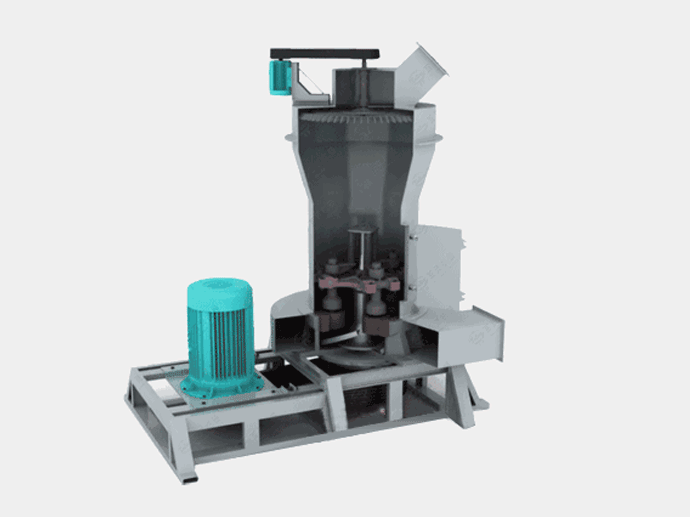
This configuration allows the Raymond Mill to achieve efficient grinding, fine particle separation, and effective dust control, making it suitable for various industries such as cement, silicate products, new building materials, refractory materials, fertilizers, and metal beneficiation.
Model | 3R2115 | 3R2615 | 3R2715 | 3R3016 | 4R3216 | ||
Milling Roller | Number | 3 | 3 | 3 | 3 | 4 | |
Diameter (mm) | 210 | 260 | 270 | 300 | 320 | ||
Height (mm) | 150 | 150 | 150 | 160 | 160 | ||
Milling Ring | Inner Diameter (mm) | 630 | 780 | 830 | 880 | 970 | |
Height (mm) | 150 | 150 | 150 | 160 | 160 | ||
Max. Feed Size (mm) | 15 | 15 | 15 | 20 | 25 | ||
Finished Product Size (mm) | 0.044~0.165 | 0.044~0.165 | 0.044~0.165 | 0.044~0.165 | 0.044~0.165 | ||
Main Motor Power (kW) | 15 | 18.5 | 22 | 30 | 37 | ||
Finish Product | 0.125 | Output(t/h) | 1.2~1.8 | 1.8~2.5 | 2.3~2.8 | 0.6~1.2 | 3.2~4.5 |
0.075 | 0.6~1.2 | 1.2~1.8 | 1.8~2.3 |
| |||
Raymond mill plant
1. Crusher to break large stones into smaller ones;
2. Suitable particles to be transferred to Raymond mill;
3. Finished products, after being ground in the Raymond mill and separated by the classifier. Dust removing system should be equipped, to avoid pollution;
4. Storage of finished products for packaging
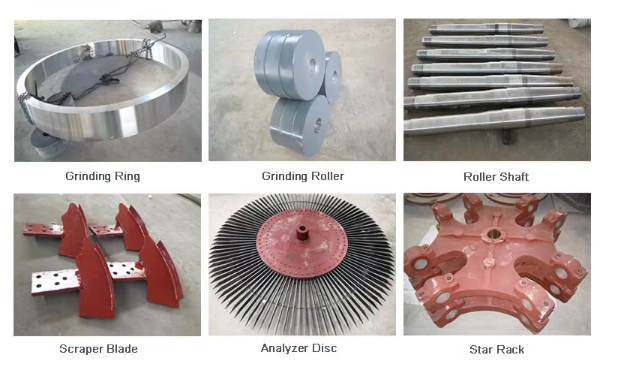
If you needs others machines , it is also avaiable
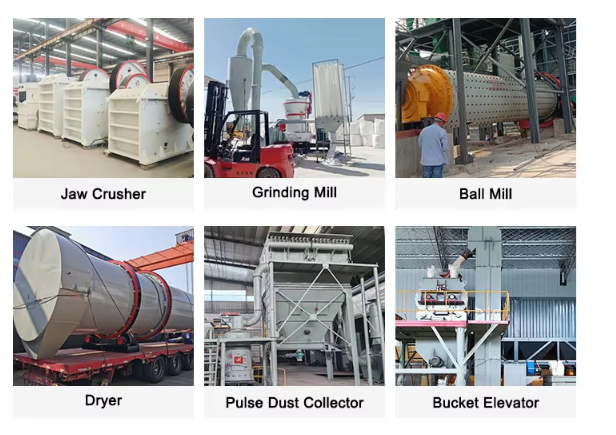
FAQ:
Q:Are you manufacture or trading company?
A: We are factory.
Q: How long is your delivery time?
A:7-10 days for the stock.15-30 days for the mass production.
Q:What is your payment method?
A:30% deposit in TT advance, 70% balance before shipment.
Q: How long is the warranty? Does your company supply the spare parts?
A:One year. Spare parts for you at lowest cost.
Q: lf l need the complete crushing plant can you help us to build it?
A:Yes, we can help you set up a complete production line and give you related professional advice. Wehad already build many mining projects in China & Overseas.
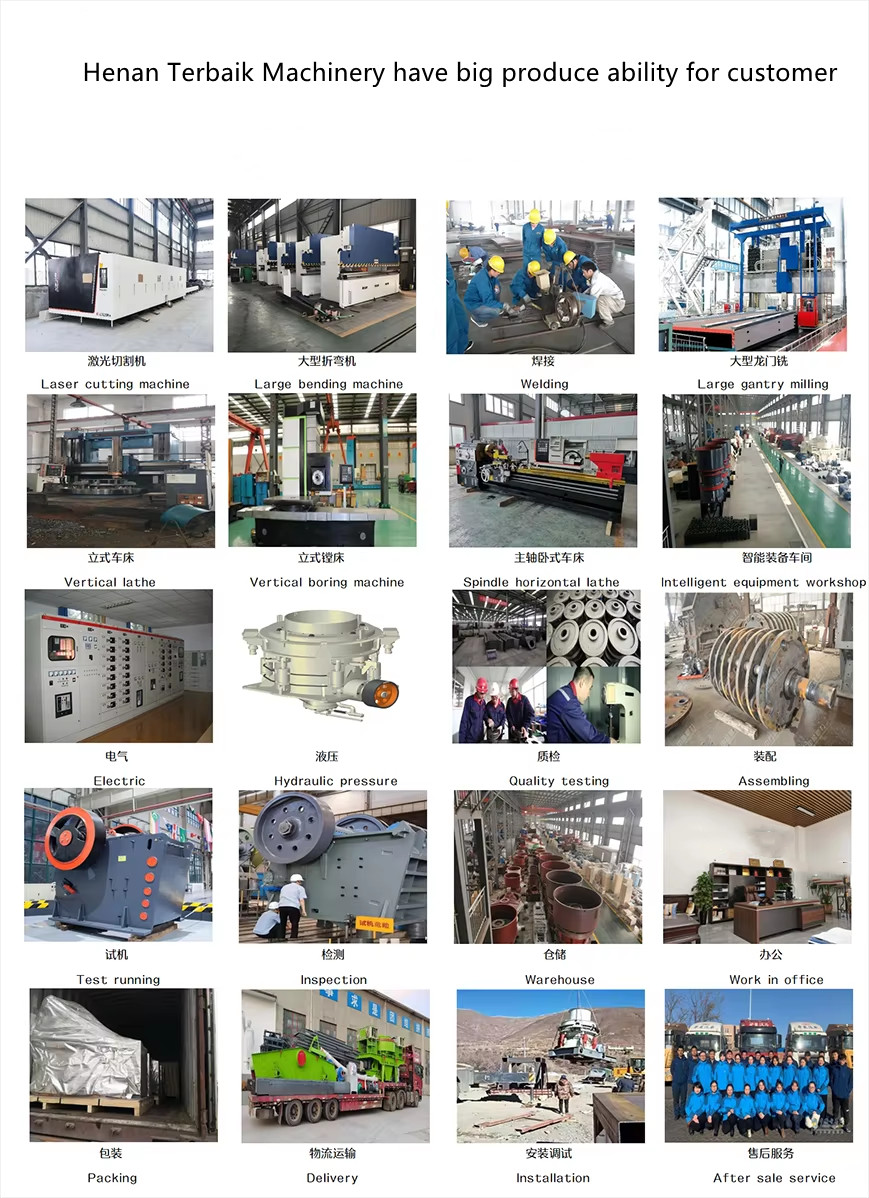
*The output will vary according to different materials, feed particle size and other factors